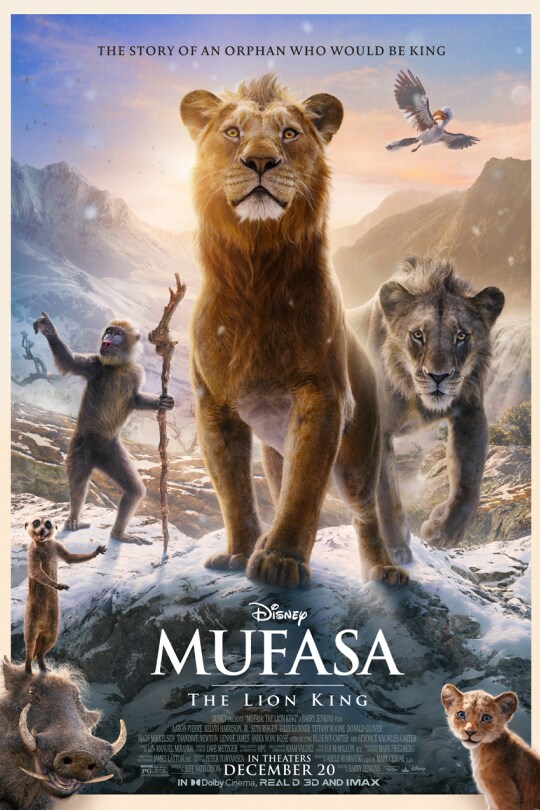Mufasa: The Lion King
Posted on December 19, 2024 at 1:35 pm
B| Lowest Recommended Age: | 4th - 6th Grade |
| MPAA Rating: | Rated PG for action/violence, peril and some thematic elements |
| Profanity: | None |
| Alcohol/ Drugs: | None |
| Violence/ Scariness: | Characters in peril, flood, animal fights, references to predators, some injured and killed, attacks by predators, some disturbing images |
| Diversity Issues: | A metaphorical theme of the movie |
| Date Released to Theaters: | December 20, 2024 |

On the 30th anniversary of “The Lion King,” Disney tells the story of Simba’s father and uncle, how they met and grew up together, considering themselves brothers, and the betrayals that tore them apart. This version is “live action,” meaning not traditional animation but realistic CGI so that we can see every detail of fur and landscape. The action and drama is punctuated with songs (Lin-Manuel Miranda taking over from Elton John) and some silly humor to sweeten the tension.
The frame story is set as an adult Simba (Donald Glover) and Nala (Beyoncé Knowles-Carter) have a daughter Kiara (Ivy Blue Carter). As a storm comes up, Kiara is scared. Her mother is away and her father leaves her with old friends the warthog Pumbaa and the meerkat Timon (Seth Rogen and Billy Eichner repeating their roles from the 2019 “live action” “Lion King”). Rafiki (John Kani, also returning from the 2019 version) tries to comfort Kiara by telling her the story of the grandfather she never got to meet, Mufasa. (The movie is dedicated to the original voice of Mufasa, the late James Earl Jones.)
Like Kiara, Mufasa was once a young cub afraid of storms. And like Kiara, he had loving parents, Masego (Keith David) and Afia (Anika Noni Rose, already Disney royalty as the voice of Tiana in “The Princess and the Frog). The area they live in has not had rain in many months and the land is parched. They decide to go in search of Milele, a land they believe is filled with lush growth and peaceful animals. On the way there, a storm creates a flood and the young cub is separated from his parents.
He is spotted by Taka, a cub his age with an English accent (remember, in the original film, Scar was played by Jeremy Irons, “brother” to American-accented Mufasa). Taka fishes Mufasa out of the water and brings him home. Taka’s father, Obasi (Lennie James) wants to eat Mufasa. He has a firm rule against outsiders. But Taka’s mother, Eshe (Thandiwe Newton) is a warm, loving, generous soul and Taka wants a “brother.” Obasi gives Mufasa a chance. If he can beat Taka in a race, he can stay. Taka allows him to win, knowing that Obasi will judge him harshly for losing. Obasi grudgingly allows Mufasa to stay, but treats him as “other” and less than by ordering him to stay away from the male lions. This allows Eshe to teach him to hunt the way the lionesses do. They become very close. Mufasa (as an near-adult lion voiced by Aaron Pierre ) has an exceptional sense of smell that allows him to identify animals and their environments even if they are far away.
Obasi’s lions are attacked by a group of pale, ghost-like lions led by Kiros (Mads Mikkelsen). Knowing they cannot survive, Obasi and Eshe send Taka (now voiced by Kelvin Harrison, Jr.) and Mufasa away, making Mufasa promise that he will protect his friend.
The two young lions have many adventures along the way. They are joined by Sarabi (Tiffany Boone), an independent female lion with a lookout bird named Zazu (Preston Nyman) and Rafiki, a wise mandrill (frequently mistaken by the other characters for a baboon). The group learns to trust and rely on each other. But Taka begins to develop feelings of resentment and jealousy.
The movie looks beautiful and the CGI allows more expressiveness than the 2019 “Lion King” remake. The songs by Lin-Manuel Miranda are not his best. They are placed at points that evoke comparisons to Elton John’s music at similar moments in the original film and the remake. The framing story, with an elderly Rafiki telling Kiara about her grandfather, is sometimes jarringly different in tone, with Timon and Pumbaa making meta jokes. I mean, a joke about getting a call from legal for using too much from a song in the earlier film? Who is that for? And since Disney owns both properties, who is going to argue about intellectual property rights being violated? At least this time they acknowledge that predators are better off than prey. That jump from the cliff moment is awfully similar to “Butch Cassidy and the Sundance Kid.” There are touching moments, but a lot of loss (even with much of it delicately off-screen) for young children.
I’m losing count of how many prequel/sequel/origin stories I’ve seen this year: “Furiosa,” “Wicked,” “Lord of the Rings: War of the Rohirrim,” “Gladiator 2,” “Transformers One.” It is hard to think of these films as anything more than fan service and brand extension. “Mufasa” is fine and most families will be satisfied. But the jubilant imagination that went into the original, make this one look as pale as Kiros.
Parents should know that this film has a lot of peril and many animals are injured and killed, mostly off-screen. Characters are caught in a flood, and a young cub is separated from his parents, who are assumed to have died. A lion speaks of eating outsiders and is bigoted of those who are not of his blood. A male cub is punished by being forced to stay with the females.
Family discussion: How were Taka and Mufasa different? Why did Taka want to change his name?
If you like this, try: the earlier “Lion King” movies and the very cute “Lion King 1 1/2”
